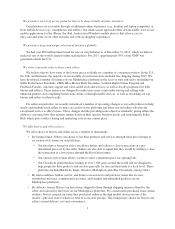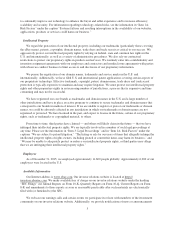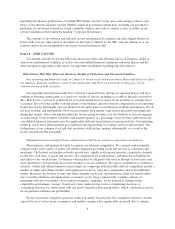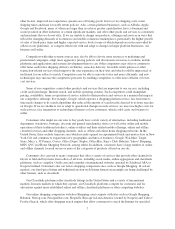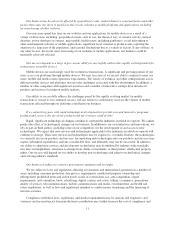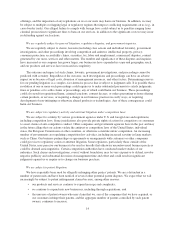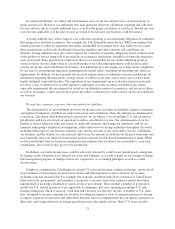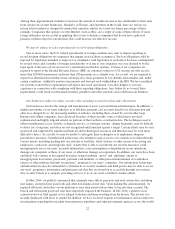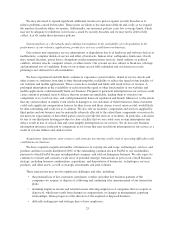eBay 2015 Annual Report Download - page 25
Download and view the complete annual report
Please find page 25 of the 2015 eBay annual report below. You can navigate through the pages in the report by either clicking on the pages listed below, or by using the keyword search tool below to find specific information within the annual report.Other laws and regulations could harm our business.
It is not always clear how laws and regulations governing matters relevant to our business, such as property
ownership, copyrights, trademarks, and other intellectual property issues, parallel imports and distribution
controls, taxation, libel and defamation, and obscenity apply to our businesses. Many of these laws were adopted
prior to the advent of the Internet, mobile, and related technologies and, as a result, do not contemplate or address
the unique issues of the Internet and related technologies. Many of these laws, including some of those that do
reference the Internet are subject to interpretation by the courts on an ongoing basis and the resulting uncertainty
in the scope and application of these laws and regulations increases the risk that we will be subject to private
claims and governmental actions alleging violations of those laws and regulations.
As our activities, the products and services we offer, and our geographical scope continue to expand,
regulatory agencies or courts may claim or hold that we or our users are subject to additional requirements
(including licensure) or prohibited from conducting our business in their jurisdiction, either generally or with
respect to certain actions. Financial and political events have increased the level of regulatory scrutiny on large
companies, and regulatory agencies may view matters or interpret laws and regulations differently than they have
in the past and in a manner adverse to our businesses. Our success and increased visibility have driven some
existing businesses that perceive us to be a threat to their businesses to raise concerns about our business models
to policymakers and regulators. These businesses and their trade association groups employ significant resources
in their efforts to shape the legal and regulatory regimes in countries where we have significant operations. They
may employ these resources in an effort to change the legal and regulatory regimes in ways intended to reduce
the effectiveness of our businesses and the ability of users to use our products and services. These established
businesses have raised concerns relating to pricing, parallel imports, professional seller obligations, selective
distribution networks, stolen goods, copyrights, trademarks and other intellectual property rights and the liability
of the provider of an Internet marketplace for the conduct of its users related to those and other issues. Any
changes to the legal or regulatory regimes in a manner that would increase our liability for third-party listings
could negatively impact our business.
Numerous U.S. states and foreign jurisdictions, including the State of California, have regulations regarding
“auctions” and the handling of property by “secondhand dealers” or “pawnbrokers.” Several states and some
foreign jurisdictions have attempted to impose such regulations upon us or our users, and others may attempt to
do so in the future. Attempted enforcement of these laws against some of our users appears to be increasing and
we could be required to change the way we or our users do business in ways that increase costs or reduce
revenues, such as forcing us to prohibit listings of certain items or restrict certain listing formats in some
locations. We could also be subject to fines or other penalties, and any of these outcomes could harm our
business.
A number of the lawsuits against us relating to trademark issues seek to have our platforms subject to
unfavorable local laws. For example, “trademark exhaustion” principles provide trademark owners with certain
rights to control the sale of a branded authentic product until it has been placed on the market by the trademark
holder or with the holder’s consent. The application of “trademark exhaustion” principles is largely unsettled in
the context of the Internet, and if trademark owners are able to force us to prohibit listings of certain items in one
or more locations, our business could be harmed.
As we expand and localize our international activities, we are increasingly becoming obligated to comply
with the laws of the countries or markets in which we operate. In addition, because our services are accessible
worldwide and we facilitate sales of goods and provide services to users worldwide, one or more jurisdictions
may claim that we or our users are required to comply with their laws based on the location of our servers or one
or more of our users, or the location of the product or service being sold or provided in an ecommerce
transaction. For example, we were found liable in France, under French law, for transactions on some of our
websites worldwide that did not involve French buyers or sellers. Laws regulating Internet, mobile and
ecommerce technologies outside of the United States are generally less favorable to us than those in the United
States. Compliance may be more costly or may require us to change our business practices or restrict our service
13


